英语词汇学第一讲
英语词汇学Chapter 01
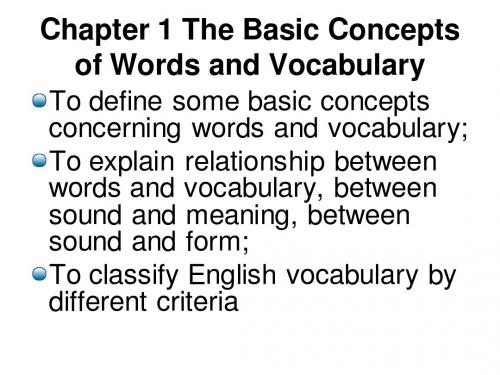
e. g. • can-opener • dip • persuader
(all-purpose key) (pick-pocket) (dagger)
e. g. • beauty (AusE: excellent, great) • auld (Scot: old) • hame (Scot: home) • lough (Irish: lake)
• This symbolic connection is almost always arbitrary, and there is ‘no logical relationship between the sound which stands for a thing or an idea and the actual thing and idea itself’ (Lodwig and Barrett, 1973)
1.5 Classification of Words • The English vocabulary, multifarious in nature, consists of words of all kinds. They can be classified by different criteria and for different purposes.
e. g. • In medicine: photoscanning, hepatitis, indigestion, penicillin • In education: audiovisual, megauniversity, microteaching
e. g. • In business: bottom line, balloark figures • In horse-racing: hold him back, hold him in • In medicine: paranoid, persona, hypo
词汇学(第一章)-PPT课件
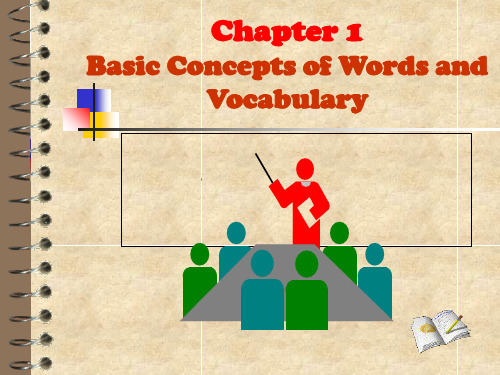
.
14
3. Native words and borrowed words 本族语词和外来语词
Native words / Angle-Saxon words
Words of Anglo-Saxon origin are native
words. They form the great majority of the
.
13
Another important characteristic is that function words belong to a relatively small and permanent set of words, in comparison to content words. The total number of functional words is about 154. They are stable; they do not come and go with changing fashions and ideas.
basic word stock of the English language.
The basic word stock is the foundation of the
vocabulary accumulated over a number of
epochs. Most native words in modern
.
6
What causes the differences between sound and form?
➢ 1) More morphemes than letters, ➢ 2) Stabilization of spelling, ➢ 3) Deliberate change of spelling by
Lecture1《英语词汇学》第一章教案

Lecture1《英语词汇学》第一章教案Self IntroductionName: ZHENG JiaqinProfessional tile: Associate ProfessorAcademic degree: Bachelor?s degreeCellular phone: 135********E-mail:jiaqinzheng1966@/doc/9510006114.html, Ways of MarkingClassroom attendance20%Assignments 20%Final test60%Text Book:《现代英语词汇学概论》张韵斐主编,北京师范大学出版社,2004-10出版◆R eference books:1. 《现代英语词汇学》-新版(陆国强, 2002, 上海:上海外语教育出版社)2.《英语词汇学教程》(汪榕培,卢晓娟,1997,上海: 上海外语教育出版社)Leture 1讲授题目:1. A Brief Introduction to the Course---English Lexicology2. The Development ofEnglish Vocabulary所属章节:《现代英语词汇学概论》第1章计划学时:2 periods教学方法:传统讲授法参考资料:《英语词汇学教程》、《英语词汇学》教学目的和要求:通过本单元的学习,学生对英语词汇学的研究对象、性质、特点以及英语语言的发展进程等基本知识有了一定的了解。
IntroductionWhat is linguistics?Generally speaking, linguistics can be defined as the scientificstudy of language. To be more exact, linguistics studies the general principles upon which all human languages areconstructed and operate as systems of human communication.LEXICOLOGY1.The term lexicology contains two Greek morphemes: “lexikon”and “logie”; the former means “word or phrase”, while the latter “learning or the study of”.2. The literal meaning is the “science of the word”.3. It is the study of the signification/meaning and application/uses of words.4. Lexicology is a branch of linguistics inquiring into the origins and meanings of words ( WNWD-Webster?s New World Dictionary of the American Language ).THE FIVE SUB-BRANCHES OF LEXICOLOGY 1.Semantics: the study of the meanings of words and other parts of language.2.Etymology: studies the meanings, origin and history of individual words and their development.3. Historical lexicology: studies from a historical point of viewthe development of vocabulary4. Phraseology(成语学): mainly deals with set expressionsand idioms.5. Lexicography: studies the writing and making ofdictionaries.English lexicologyEnglish lexicology deals with English words, their origin, meaning, morphological structures, semantic structures, sense relations , idioms, historical development, formation and usages.The Nature of English LexicologyEnglish lexicology is a theoretically-oriented course. It is chiefly concerned with the basic theories of words in general and of English words in particular. However, it is a practical course as well, for in the discussion, we shall inevitably deal with copious stocks of words and idioms, and many usages examples. Naturally, there will be a large quantity of practice involved.THE AIMS OF THIS COURSEOffer an insight into the origin and development of the Englishvocabulary.Give a systematic description of the English vocabulary.Discuss the problems of word-structure and word-formation Study the use of English words , their meanings and changes in meaning, their sense relations.THE SIGNIFICANCE OF THE COURSEDevelop your personal vocabulary and consciously increase your wordpower (active vocabulary).Understand word-meaning and organize, classify and store words moreeffectively.Raise your awareness of meaning and usages, use words more accurately and appropriately.Develop your skills and habits of analyzing and generalizinglinguisticphenomena in your learning experiences.Ultimately improve your receptive and productive skills in languageprocessing as well as language production.TWO APPROACHES TO THE STUDY OF ENGLISHLEXICOLOGYA synchronic approach is an approach to the study of a language at one period of time,A diachronic approach is an approach to the study of the change in a language that took place over a period of time.There are two approaches to the study of words, namely synchronic and diachronic. From a synchronic point of view, words can be studied at a point in time, disregarding whatever changes might be taking place. For example the word …wife? now means ……a married woman, esp. in relation to her husband??. This is the current meaning.It has an obsolete meaning …woman?, which is only preserved in midwife, housewife, Bathwife, etc. However if we take a diachronic perspective, we will consider the word historically, looking into its origin and changes in form and meaning. In this light, the word …wife? evolved from the old English … wif ?, meaning … woman?, but later it became specialized in the course of development to the modern meaning …a married woman?.TWO APPROACHES TO THE STUDY OF ENGLISHLEXICOLOGYModern linguistics is mainly synchronic, focusing on the present-day language (English words), but we need the diachronic approach as a supplement, for a knowledge ofhistorical development of the vocabulary will definitely be of great help to us in our language study.Questions and Tasks1. What is lexicology?2. What is the nature and scope of English lexicology?3. Why should a student of English study English lexicology?。
英语词汇学
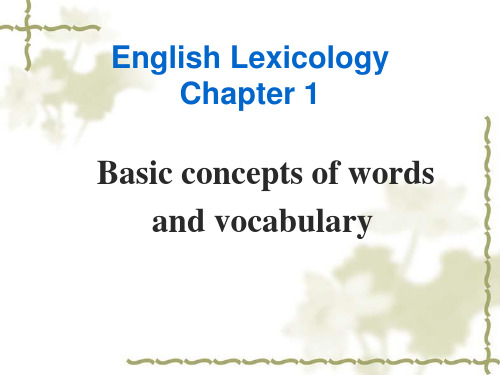
What is a Chinese phrase(词组)
❖ 词组又叫短语,是大于词的语言单位,是由两个或两个以上的实词构成 而不成为句子的语言单位。
❖ 词和词组的区别: ❖ 1、意义上,词表示简单的概念,词组复合的概念。 ❖ 2、语法功能上,词是句法结构中最小的独立运用的单位,词组也是句
morphemes. ❖ The word occurs typically in the structure of
phrases. ❖ The word should belong to a specific word
class or part of speech.
Simple and plex words
English Lexicology Chapter 1
Basic concepts of words and vocabulary
本文档后面有精心整理的常用PPT编辑图标,以提高工作效率
Abstract
❖ This chapter gives a scientific definition of a word, discusses the relationship between sound and meaning, between sound and form, between words and vocabulary, puts forward the three main principles of lexical classification and elaborates on the features of basic word stock and non-basic vocabulary, content words and functional words, native words and borrowed words.
英语词汇学(第一讲)
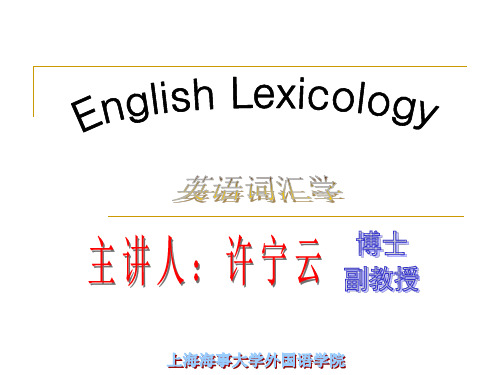
A language is a system of signs (symbols, indices, icons) for encoding and decoding information.
2). A. any means of expressing or communicating, as gestures, signs, or animal sounds
B. a special set of symbols, letters, numeral, rules etc. used for the transmission of information, as in a computer
To indicate a food source that is too distant from the hive to be smelled or seen, the scout bee dances on the honeycomb in the hive.
If the food source is within about 50 meters (160 feet) of the hive, the bee does a circular dance on the honeycomb.
I love you.
(In American Sign Language)
Guess the mood from the facial expressions
《英语词汇学第一章》PPT课件
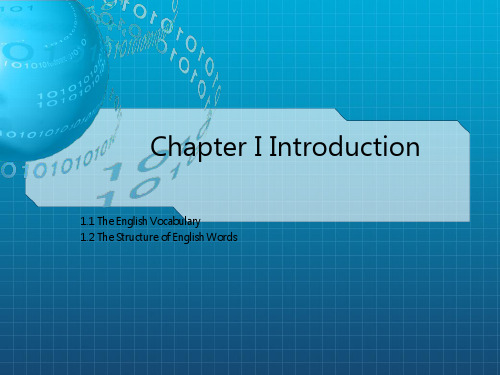
• B. Allomorphs 词素变体 • A morpheme may take various shapes or forms. • 如:books, pigs, horses共同词素是什么? • 曲折词素-(e)s。 • 有三种不同发音:/-s, -z, -iz/
• An elusive notion • have has had ? • friend friends ?
• entry词条in a dictionary --- lexeme 词位 • word form 词形:词的不同形状 • lexical unit 词汇单位:一个词形跟一个意义的结合
• Definition: • A word is an independent, minimal, meaningful linguistic unit.
• 粘着词根大多源自希腊语或拉丁语,不能独立使用。
• 观察下面几个单词,找出共同词根: • revive, vitamin, vital, vivacious, vivid • 拉丁词根:vit-/viv-, 意思:life or live • 复兴,复活;维生素;十分重要的;生机勃勃的,活泼的;生动的
zable into smaller forms. • 词素是语言中最小的语音语义结合体。(P13)
• Q: What’s the difference between a “word” & a “morpheme”? • 词:能独立运用的、最小的语音语义结合体 • 词素:不一定能独立运用 • Example • 试分析:denationalization共有几个词素? • nation • nation+al • nation+al+ize • de-nation+al+ize • de-nation-al-iz-ation 使非国有化,使私营化
词汇学第一讲
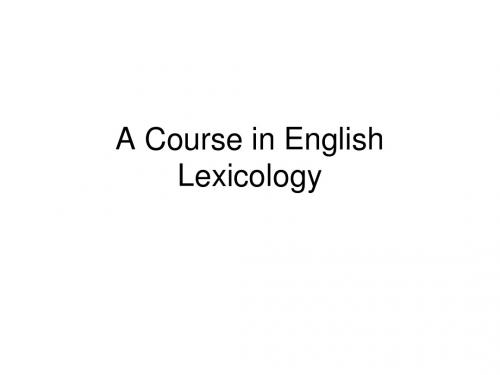
1.3 Sound and Form
• It is generally agreed that the written form of a natural language is the orthographical(拼法) record of the oral form. Naturally the written form should agree with the oral form. In other words, the sound should be consistent with the form. • Question: Do you think such viewpoint lies in our real language world?
• To sum up, the definition of a word will cover the following points: • (1)a minimal free form of a language • (2)a sound unity • (3) a unit of meaning • (4) a form that can function alone in a sentence. • Then can you give a definition according to the above points?
• Example, some short vertical strokes such as “i, u, v, m, w, n” looked all alike, consequently, their handwriting caused misunderstanding, to solve the problem in part, they changed the letter “u” to “ o ”when it came before “m, n, v.”(we have no “uv”, immoral, impolite, illegal, irregular)
词汇学第一章 The Basic Concepts of Words and VocabularyPPT
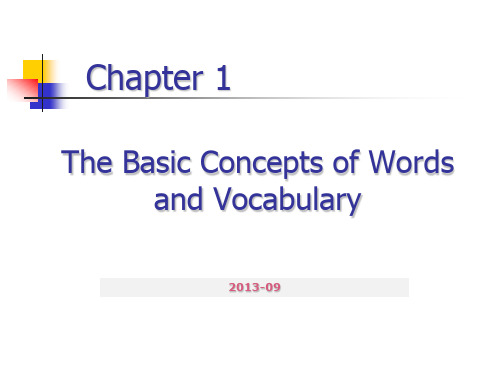
1.4 Sound and Form
Task 1 Say the following words by yourself.
cough
thought
though
thorough
tough
through
Question: why is there the disparity?
The international reason Changes Borrowings
1.3 Sound and Meaning
In how many languages do you know the name of the animal in this picture?
Task 1 Say the name of the animal in
as many languages as you can.
content words and which are functional words? denote never and run notion upon seven Christmas have would
1.5.3 Native words & borrowed words
Task
Guess whether the statements are true or false.
non-basic vocabulary
Not all the words of the basic word stock have these features.
Non-basic vocabulary include:
Terminology 专业术语 Jargon 行话 Slang 俚语 Argot 隐语 Dialectal words 方言词 Archaisms 古词语 Neologisms 新词语
实用英语词汇学讲座1

实用英语词汇学1学术意义上的英语词汇学博大精深。
本人拟讲之词汇学定位在实用上,是借用构词法知识,通过文化朔源、近义归纳、来对英文词汇进行组合,使记词2趋向于逻辑记忆与趣味记忆,以达到提高学习效率,扩展词汇的目的。
学习重点3形义相似文化溯源、构词法则。
4学习难点:记词思维的转换5一、构词法记词(一)词根的概念(1)自由根,独立成词able disable unable enable view review preview interview6port import export transportporter portable school scholar scholarship scholasticpair impair repair7clear clarify declare appear apparent transparent(2)粘着根,该类词根必须与其他词缀组合方能成词8vis(看)visit visible vision revise supervisesol(日、太阳)solar insolate son(声音)resonant supersonic unison sonic9lun(月亮)lunar plenilune patr(i)(父亲) patriot expatriatepatroncompatriotmot(动)motion motive10motivationpromoteauto(自,自己)automobile automation automatic11bio(生命)biographybiologybiosphereautobiography tele telecom telescope12telegraphy telegram二、文化组合法对一些单词寻根追源,结合文化背景进行组合13例1:ChristmasChristChristenChristianity14例2:Ever 今义:曾经;古代有永远之意,这一点今天体现在组合词中:evergreen15everlastingforevereverbright例3:Genesis gene genetic 可与圣经故16事创世纪结合例4:man human exhume inhume圣经上讲上帝用泥土造人,human一词中“hum”作为词根有17泥土之意,exhume 从词汇构成上看是ex+hum+e,组合成为基本义是从土中出,引申为挖掘。
英语词汇学 chapter 1
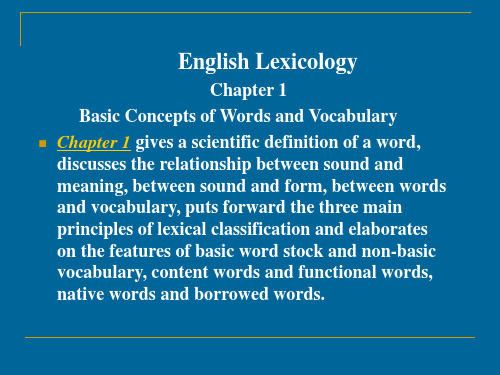
1.1 Definition of a word
There has been no agreed definition to the term
“word”. The definition may have the following
versions:
① a minimal free form of a language;
② a sound unity;
③ a unit of meaning;
④ a form that can function alone in a sentence.
To sum up, we can say that “a word is a minimal free form of a language that has a given sound and meaning and syntactic function”.
sight(视力), site(场所), cite(引证)
vain (陡然), vein(静脉),vane(风向标)
1.3 Sound and Form
Form refers to the written form of the oral form. Naturally the written form should agree with the oral form. In other words, the sound should be similar to the form. This is true of English in its earliest stage, e. g. Old English.
too.
Numerous linguistic facts prove the opinion held by the Conventionalists is correct, whereas the thesis by the Naturalists can’t hold water.
英语词汇学课件chapterI概要
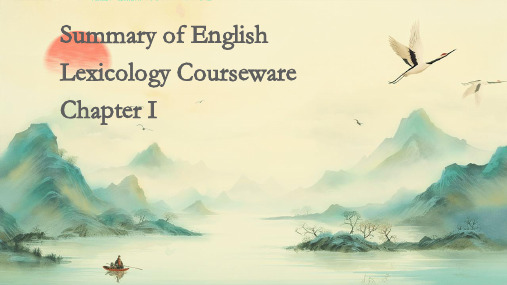
Types of semantic change include extension, narrowing, metaphorical extension, and pejoration.
Understanding semantic change is important for accurate communication and avoiding misunderstandings.
Compound vocabulary can help express complex ideas and concepts more concisely, and can enrich the language expression.
Compound vocabulary is also a common way to create new words in English, and can help English learners expand their vocabulary.
of word formation and meaning change. • To develop learners' ability to apply Lexicological knowledge to language learning and usage, and to
enhance their language proficiency and communication skills. • To cultivate learners' independent learning and thinking abilities, and to inspire their interests in
英语词汇学系列讲座(英)1
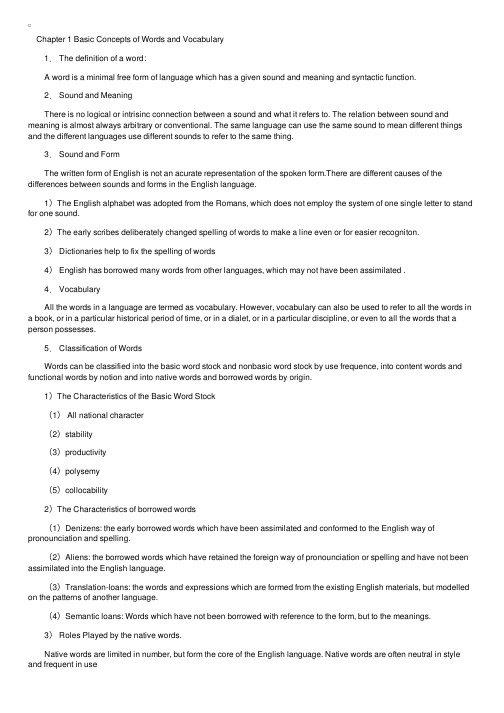
Chapter 1 Basic Concepts of Words and Vocabulary 1. The definition of a word: A word is a minimal free form of language which has a given sound and meaning and syntactic function. 2. Sound and Meaning There is no logical or intrisinc connection between a sound and what it refers to. The relation between sound and meaning is almost always arbitrary or conventional. The same language can use the same sound to mean different things and the different languages use different sounds to refer to the same thing. 3. Sound and Form The written form of English is not an acurate representation of the spoken form.There are different causes of the differences between sounds and forms in the English language. 1)The English alphabet was adopted from the Romans, which does not employ the system of one single letter to stand for one sound. 2)The early scribes deliberately changed spelling of words to make a line even or for easier recogniton. 3) Dictionaries help to fix the spelling of words 4) English has borrowed many words from other languages, which may not have been assimilated . 4. Vocabulary All the words in a language are termed as vocabulary. However, vocabulary can also be used to refer to all the words in a book, or in a particular historical period of time, or in a dialet, or in a particular discipline, or even to all the words that a person possesses. 5. Classification of Words Words can be classified into the basic word stock and nonbasic word stock by use frequence, into content words and functional words by notion and into native words and borrowed words by origin. 1)The Characteristics of the Basic Word Stock (1) All national character (2)stability (3)productivity (4)polysemy (5)collocability 2)The Characteristics of borrowed words (1)Denizens: the early borrowed words which have been assimilated and conformed to the English way of pronounciation and spelling. (2)Aliens: the borrowed words which have retained the foreign way of pronounciation or spelling and have not been assimilated into the English language. (3)Translation-loans: the words and expressions which are formed from the existing English materials, but modelled on the patterns of another language. (4)Semantic loans: Words which have not been borrowed with reference to the form, but to the meanings. 3) Roles Played by the native words. Native words are limited in number, but form the core of the English language. Native words are often neutral in style and frequent in use。
英语词汇学_完整版

Qin jianping
Chapter one Language,
and Lexicology
Step 1
Linguistics
Discuss: What is lexicology and why do we need to study it? a. Lexicology is a branch of linguistics, concerned with the study of the vocabulary of a given language. It deals with words, their origin, development, history, structure, meaning and application. In short, it is the study of the signification and application of words. It aims at investigating and studying the morphological structures, semantic structures, relations, formation and usages. It is a theoretically-oriented course as well as a practical course.
2009 Words meaning and Componential analysis 4
Step 2 The connection of lexicology with other branches of linguistics a. with phonetics, which is the study of speech sounds made in spoken, without speech sound, there is no word because every word is a unity of sound and meaning. ( Duality: one design feature of human language, which refers to the property of having two levels: sounds level and meaning level.)
英语词汇学 Chapter1

English is a crazy language, full of wonders and attractions, thus making it an interesting subject as well as a useful one.
8
What is language?
Language is a system of arbitrary vocal symbols used for human communication. It is a specific social action and a carrier of information.
Aims of the course:
Offer an insight into the origin and development of the English vocabulary. Discuss the problems of word-structure and word-formation Study the use of English words , their meanings and changes in meaning, their sense relations. Give a systematic description of the English vocabulary.
5
If a vegetarian eats vegetables, what does a humanitarian eat? Why do people recite at a play, and play at a recital? Ship by truck or car and send cargo by ship?(动词与动 词的功能差异;为什么演话剧时人们要朗诵,而在 独奏会上却要演奏:----(polysemy)一词多义
《词汇学》英文版课件Chapter 1 English Lexicology--Introduction

Teaching focus:
1.1 What Is a Word
a minimal free form of a language a sound unit a unit of meaning a form that can function alone in a sentence “A word is a minimal free form of a language that has a given sound and meaning and syntactic function”. 词是具有一定的声音、意义和语法功能,能独 立运用的最小的语言单位。
Morphology studies the structures or forms of words through the use of morpheme construct Etymology studies the origins and history of the form and meaning of words. Semantics studies the meanings of words and sense relations: polysemy,homonymy,synonymy,antonomy, hyponmy, and semantic field
• 1.2 Sound and Meaning • There is no logical or intrinsic connection between a sound and what it refers to. The relation between sound and meaning is almost always arbitrary or conventional. The same language can use the same sound to mean different things and the different languages use different sounds to refer to the same thing.
英语词汇学张维友编第一讲.ppt

• Lexicology is a science which gives research on the form, meaning and the vocabulary system, on learning lexicology, we can better grasp the relationship among vocabulary, enlarge vocabulary on the basis of analysis of words and improve the ability of using language flexibly.
• 4.Word meaning and componential analysis(2 times)
• 5.Sense relations(2 times)
• 6.Changesຫໍສະໝຸດ in word meaning(2 times)
• 7. Meaning and context(2 times)
• 8. English idioms(1 times)
A Course in English Lexicology
• Why should we learn lexicology?
• Language learning includes the learning of pronunciation, grammar and vocabulary, among which vocabulary is essential. A famous scholar Werkers once said, without grammar, very little can be conveyed, without vocabulary, nothing can be conveyed. And, no matter how well the student learns grammar, no matter how successfully he masters the sounds of a second language, without words to express a wide range of meanings, communication in that language can’t happen in any meaningful way.
英语词汇学教程课件第1章English Lexicology 1
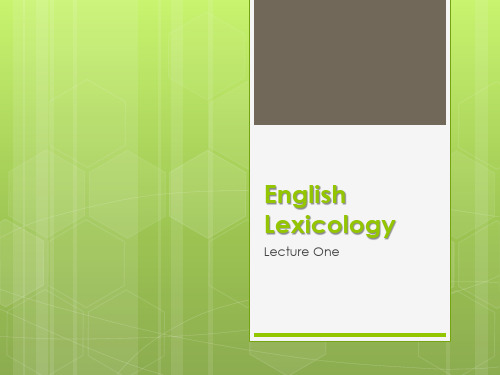
Lexicography involves the writing and compilation of dictionaries, especially dealing with the principles that underlie the process of compiling and editing dictionaries.
a new waste paper basket
The second type of definition considers the word as a thought unit or a psychological unit.
Farmer Rethink Spoonful all of a sudden as usual.
Semantics
Semantics studies meaning. It is usually approached from one of two perspectives: philosophical or linguistic.
Philosophical semantics is concerned with the logical properties of lanபைடு நூலகம்uage, the nature of formal theories, and the language of logic.
Linguistic semantics involves all aspects of meaning in natural languages, from the meaning of complex utterances in specific context to that of individual sounds in syllables.
- 1、下载文档前请自行甄别文档内容的完整性,平台不提供额外的编辑、内容补充、找答案等附加服务。
- 2、"仅部分预览"的文档,不可在线预览部分如存在完整性等问题,可反馈申请退款(可完整预览的文档不适用该条件!)。
- 3、如文档侵犯您的权益,请联系客服反馈,我们会尽快为您处理(人工客服工作时间:9:00-18:30)。
1
Lecture 1
2020/12/2
2
Different ways of greeting people
A firm handshake
A kiss
2020/12/2
A bow
A loving hug
3
Do you know the raised dots below? Braille
2020/12/2
13
Mental Retardation
Mental retardation usually reflects below average intellectual functioning (IQ is less than 70)
People can be retarded in most areas yet average or gifted in others
2020/12/2
18
Bees dance for their honey
When bees find a new food source they go back to the hive and do a dance that tells the other bees the direction and distance of the food.
Emotion + icon=emoticon
Communication with people’s eyes
a movement of the hands, arms or head, etc. to
express an idea or feeling Feelings are reflected on
9
Guess the mood from the facial expressions
confused
angry
2020/12/2
happy
sad
tired
10
Examples of IQ Test Items
2020/12/2
11
IQ Issues
IQ scores are influenced by:
2020/12/2
14
Use these supplies to mount the candle on a wall
2020/12/2
15
Solution to Candle Problem
2020/12/2
16
Communication between animals
2020/12/2
17
2020/12/2
19
To indicate a food source that is too distant from the hive to be smelled or seen, the scout bee dances on the honeycomb in the hive.
2020/12/2
4
Have you ever been shocked by the magnificent performance?
2020/12/2
5
Other means of communication
Emoticons Eye contact Gestures
Facial expressions
:-P = making a face smiling.
2020/12/2
7
Gestures by hand
Thumbs up! Thumbs down! Victory/win
2020/12/2
Ok!
Call me! Applause
8
I love you.
2020/12/2
(In American Sign Language)
Socioeconomic status: middle class kids tend to do better than lower class kids
Language status: children from the dominant culture tend to do better
Age: IQ scores on timed tests tend to decline with age
Heredity: IQ scores of identical twins raised apart are quite similar
2020/12/2
12
Stat020/12/2
6
Guess the meaning of the each following emoticons
:- ) = ☺
:~-( = crying
:-( = sadness
:-O
= surprise
8-)
= A man who is
:-D = great joy
wearing glasses is
Animal language
Like human beings, animals need to communicate with each other to survive. They do not speak to each other in the same way as we do; instead they use many different sounds and actions to express themselves. For example, bees make a buzzing noise, lions and bears growls, cats miaow, and dogs bark. If you see a cat standing with its back arched, head lowered or legs bent, it could be scared. If a dog growls at you, it probably is angry and you should be careful. Animal language is simpler than human language, but it shows how intelligent animals are.
